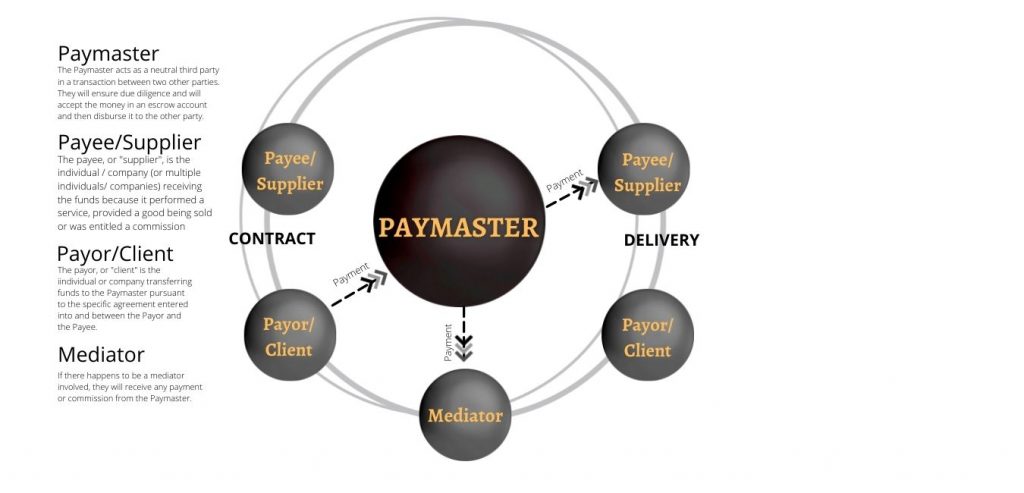What is Paymaster? Bianchi Fasani Law

What is Paymaster? In today’s article, Bianchi Fasani Law will explain what a Paymaster is and what services Paymasters provide.
A Paymaster is a person or entity who acts as a neutral third party in transactions between two individuals, entities, businesses, etc.
The Paymaster ensures due diligence, ensures the transaction is legitimate, and makes sure to carry out the transaction safely and effectively.
A Paymaster is often an attorney because attorneys have the ability to use an Attorney Trust Account, also known as “IOLTA Trust Account.”
These accounts are used mostly for short-term escrow transactions.
A IOLTA Trust Account provides an extra level of security because it is carefully monitored by the state bar in which the attorney is licensed.
As an attorney, the Paymaster is subject to large penalties and could even be disbarred if funds
are misappropriated.
How does the process work?
An individual contacts the Paymaster and the two parties enter into a transaction.
The Paymaster will review the agreement to understand who is paying, who is receiving the payment, what they are paying/getting paid for, and when payment should be complete.
The buyer will wire money into the IOLTA Trust Account, and then the Paymaster will disburse the funds based on the agreement and any other instructions by the parties.
A Paymaster is beneficial because it provides a trusted third party to facilitate the payment and disbursement of funds.
Paymasters are ofted used for transactions involving goods, services, or products that usually involve large amounts of money.
Bianchi Fasani Law can provide this service to private individuals, companies, or large corporations.

Interested in using Bianchi Fasani Law for Paymaster services?
Please schedule a 15-minute Intro call using this Link to discuss the transaction or contact us for further information.

What Happens to the Florida Exemption if the Property is rented for a few Months?
What Happens to the Florida Exemption if the Property is rented for a few Months? What and who does the Florida Homestead Exemption clause protect? Section 4 of Florida’s Constitution [http://leg.state.fl.us/Statutes/index.cfm?Mode=Constitution&Submenu=3&Tab=statutes#A10S04] maintains that a

The Taxation of Collectibles
The Taxation of Collectibles The concept of taxation of collectibles is relatively unfamiliar to many practitioners. There are various reasons behind the misconception that goes around. One of the primary reasons is that the

THE REAL ESTATE MARKET IN MIAMI IS BOOMING – PUBLISHED IN FORBES
While Covid brought many things to a halt, one thing that actually accelerated during the pandemic was Miami’s real estate market.

Cryptocurrency and Tax Implications
The whole world is watching as Bitcoin and the rest of the cryptocurrency market keep notching new record highs. How is cryptocurrency taxed?

